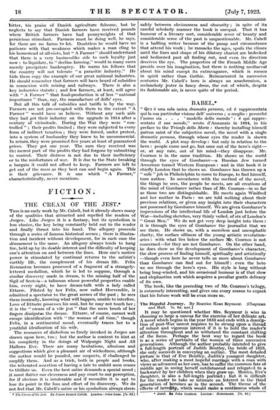FICTION.
THE CREAM OF THE JEST.*
Tins is an early work by Mr. abell, but it already shows many of the qualities that attracted and repelled the readers of Jurgen. Like Jurgen it is a fantasy, but its symbolism is less elusive, the key being constantly held out to the reader and finally thrust into his hand. The allegory proceeds through a series of famous historical scenes ; there is illustra- tion and incident without development, for in each case the denouement is the same. An allegory always tends to hang fire, held up by its doable interest and the difficulty of keeping one's attention on and between the lines. Here one's motive power is stimulated by continual returns to the satirist's earthly life, the complement of his dream life. Felix Kennaston becomes possessed of a fragment of a strangely- lettered medallion, which he is led to suppose, through a similar discovery made in dream, is the missing half of the Sigil of Scoteia—a talisman whose powerful properties enable him, every night, to have dream-talk with a lady called Ettarre. Piloted by her Felix, now called Horvendile, is admitted a spectator to the great scenes of the past ; he sees them ironically, knowing what will happen, unable to interfere. Love of Ettarre possesses his soul, but he may not touch her ; it is the "cream of a vile jest" that the mere brush of her fingers dissipates the dream. Ettarre, of course, cannot well escape identification with "the woman of all time," though Felix, in a sentimental mood, eventually traces her to a youthful idealization of his wife.
The resources of diabolism so freely invoked in Jurgen are drawn upon here, too ; but the author is content to hint at his complicity in the doings of Walpurgis Night and All Hallows Eve. There are many hesitations, allusions and suggestions which give a pleasant air of wickedness, although the author would be puzzled, one suspects, if challenged to amplify them. And as a trick, both in people and books, the reiterated assertion of having a tale to unfold soon ceases to titillate us. Even the best satire demands a special mood ; it must flatter our cleverness and pay court to our perception, for if obvious it is intolerable and if recondite it is apt to lose its point in the fuss and effort of its discovery. We do not feel that Mr. Cabell's satire or his symbolism always steers • The Cream of the Jesi. By daroes Branch Cabal. London : John Lane. Vs. dd.]
safely between obviousness and obscurity ; in spite of its careful scholarly manner the book is unequal. That it has humour of a literary sort, considerable sense of beauty and considerable sense of the past is unquestionable. Mr. Cabell is a baffling writer because of the pomp and circumstance that attend his work ; he ransacks the ages, spoils the climes until the lines and shape of his dilatory chariot are bedecked and bedizened past all finding out, and even its direction deceives the eye. The properties of the French Middle Age preside over his imagination, but there is nothing mediaeval about his mind except its extravagance, which is rococo in spirit rather than Gothic. Reincarnated in successive centuries Mr. Cabell's hero is always an anachronism, a melancholy jester in fancy dress, the cut of which, despite its fashionable air, is never quite of the period.














































 Previous page
Previous page